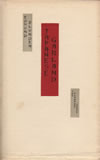
BD. Edmund Blunden
 |
 |
|||
 |
 |
|||
| The first book-length collection of poems of Japan published by an English poet in England. Illustrations by Eileen Mayo. | ||||
18. Japanese Garland. [London]: Beaumont, 1928.
The first book-length collection of poems of Japan published by an English poet in England. Collects most of Blunden’s earliest poems set in Japan in an edition of 390. Reprints A ‘First Impression’: Tokyo (1a), The Daimyo’s pond (1b), Far East (3), ORNAMENTATIONS (formerly Oriental Ornamentations, 12), Eastern Tempest (14a), Building the Library, Tokyo University (15), and INLAND SEA (formerly Japanese Nightpiece, 16). All poems that appear here are reprinted in 27 and 30. See also 172 and 188.
a. The Quick and the Dead. Suggests that the memory of friends walking together in Nara is more important than memory of the famous sights of the ancient capital. The opening line sets the scene—‘Once we three in Nara walked’—and following lines describe the sights of the city, including Tôdaiji and the Great Buddha, here described as ‘louring’ with ‘a dead man’s eye’. Okada suggests that the work is a love poem about walking in Nara with Hayashi Aki (see 191), with ‘three friends’ depicted instead of two as an ‘effort to hide [the] love affair’. See also 16. Reprinted in 125.
b. The Inviolate. Describes a scene on the ‘white Pacific shore’ where a ‘vigil circled’ by temple gates watches a ‘black ship’, a reference to the Japanese description of the ships of Perry’s expedition to Japan in 1853. The ‘murmur’ that the black ship ‘waits the crash of our typhoon’ refers to the sudden storms that destroyed Mongol invasion forces in 1274 and 1281 in what until Perry arrived had been the only serious threats to Japan from abroad, and which left the Japanese for nearly six centuries with the sense that they were ‘inviolate’, protected by kamikaze, the divine wind. See also 16. Reprinted in 125.
c. On a Small Dog, thrust out in a Tokyo Street soon after his birth, and rescued in vain. An elegy for the small dog of the title. Relies on a simile of cherry blossoms, ‘whose life thin-spun / Seems by its own ghost haunted’.
d. The Author’s Last Words to his Students. A note identifies the students of the title as those ‘in the school of English Literature, at Tokyo Imperial University, 1924-1927’. An apology and tribute to Blunden’s students, written from England. The speaker asks forgiveness for his ‘harsh intrusion’, ‘gloomed perspective’, and ‘hobbling commonplaces’ upon the ‘bright passion’ of his former students, and wishes them well. Okada (191) suggests that the ‘formalised modesty’ of Japanese society had influenced Blunden in a way that can be seen here. Saitô (179a), referring to Blunden’s many ‘unforgettable’ poems about Japan, cites this work in particular: ‘it ‘will be ever dear to us [Japanese], for it reflects [Blunden’s] modesty, gentleness, and thoughtfulness’. Reprinted in 69, 125, 165, 168, and 179. Blunden reads the poem on British Council Tape No. 752, 3 September 1964 (London: British Council) and The Poet Speaks, Record 10 (London: Argo, 1968).

